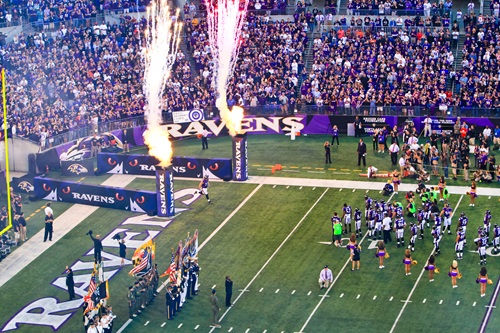
For decades, pyrotechnics have been associated with summer sporting events (such as those held at baseball stadiums), as well as major holiday celebrations. But these days, there is a distinct and growing anti-fireworks sentiment. Lighting the fuse is an increase in injuries as well as concerns about pollution from smoke, chemicals and debris, and the impact of loud booms on those suffering from PTSD—not to mention the freak outs of pets and other animals.
And the concerns skyrocket regarding careless kids and irresponsible adults getting their hands (with or without all digits intact) on both legal and illegal fireworks, often with gruesome and unintended consequences such as physical injury, fires, property damage and the disturbing of peace.
The concerns started out in isolation several decades ago and have continued to grow. It was all the way back in 2008 that Athletic Business started reporting on the issue, noting that the Colorado Springs Sky Sox stopped using pyrotechnics after a technician received serious facial injury while doing routine rigging of fireworks slated to go off that night. In 2021, the publication noted, a student at Michigan State was seriously injured by fireworks and successfully sued the school.
Sentiment has been growing as well, noted AB: “In May, NBA commissioner David Stern described the player introductions that accompanied 2008 playoff games as "ridiculous." In Cleveland, flames shot out of the center-hung scoreboard with such intensity that fans seated courtside could feel the heat. "I think that the noise, the fire, the smoke, is a kind of assault that we should seriously consider reviewing in whether it's really necessary given the quality of our game," Stern said.
This year, the reports are no less worrisome. On July 4, 2024, the LA Times reported that a pyrotechnics worker was seriously injured and two other fireworks professionals suffered minor injuries due to a misfire and explosion during a show sponsored by the city of La Puente. The incident, held at the La Puente Baseball Field, brought the show to an abrupt halt.
USA TODAY also ran a story on July 5, 2024, highlighting recent fireworks mishaps. Among them were a South Carolina man who lit a large firework and placed it on his head (and died of his injuries); and a pyrotechnician in Alabama who was taken by medical helicopter to a hospital after a shell ‘unexpectedly detonated’ during a slated firework celebration, injuring him and cancelling the show. In Utah, several people suffered injuries during an annual fireworks celebration at Brigham Young University's LaVell Edwards Stadium in Provo when fireworks shot into the stadium crowd.
In its Fireworks Injuries & Deaths 2023 Report, the Consumer Product Safety Commission received reports of eight deaths and an estimated 9,700 injuries involving fireworks. Out of the eight deaths, five were associated with firework misuse, two with a device malfunction, and one involved unknown circumstances. The study also shows that between 2008 and 2023, injuries from fireworks have increased overall, despite recent data showing a steady decline since the peak in 2020 during the pandemic when public displays were cancelled.
 The CPSC notes that in 2023, about 42 percent of emergency-department treated fireworks-related injuries were for burns—not a surprise in light of the fact that sparklers burn at temperatures of about 2,000 degrees Fahrenheit, hot enough to melt some metals. Moreover, in fiscal year 2023, about 18 percent of selected and tested fireworks products were found to contain noncompliant components, including fuse violations, the presence of prohibited chemicals and pyrotechnic materials overload.
The CPSC notes that in 2023, about 42 percent of emergency-department treated fireworks-related injuries were for burns—not a surprise in light of the fact that sparklers burn at temperatures of about 2,000 degrees Fahrenheit, hot enough to melt some metals. Moreover, in fiscal year 2023, about 18 percent of selected and tested fireworks products were found to contain noncompliant components, including fuse violations, the presence of prohibited chemicals and pyrotechnic materials overload.
It's no wonder that more people are getting hot under the collar and are convinced that fireworks are a big dud. In a column titled, “Why I Hate Fireworks,” Toni Shah, writing for the Citizen of East Alabama, pointed to noise, property damage, injury and death. “Last but not least, there is the effect on the environment. Fireworks have high concentrations of particles containing metals, organic compounds and gases which can contaminate rivers, lakes and our drinking water.” Shah suggests abandoning fireworks and using laser lights instead.
Similarly, Outside Magazine’s Kristin Hostetter is adamant that, “Fifteen minutes of ooh-ing and ah-ing isn’t worth the wildfire risk, pollution and trauma to wildlife.” In 2022, fireworks sparked an estimated 31,302 fires (85 percent of which were wildfires) that caused about $109 million in property damage, according to the National Fire Protection Association.
So, if traditional fireworks displays are destined to go up in smoke, what are the alternatives? The aforementioned laser light shows are one option, and this has already proven popular in Flagstaff, Arizona. Another is drone shows which are quickly gaining acceptance. Locales including San Antonio, Boulder, St. Louis, Salt Lake City, Napa and Nashville have already made the switch. Tahoe City, Calif., held a show in 2023 that used 300 drones that were synched to music. Other entities such as Disney, movie studios and sports leagues are also incorporating drone shows into their holiday festivities and other events.
USA TODAY quoted Rick Boss, president of Dallas-based Sky Elements Drone Shows, as saying that his business has grown 60 percent over the past year. After staging 12 shows on July 4 and 44 around the holiday in 2023, the company is producing 21 and 68 this year, and Boss adds that his firm puts on at least 50 percent of the retail shows nationally.
According to Boss, the price for a single show starts at $15,000 and goes up depending on the complexity and the number of units. He recommends at least 200 drones for a large gathering. The average number for a Sky Elements performance is 300, typically costing $45,000 all included. Though costs have been dropping, they’re still usually higher than for a large fireworks production, which averages about $1,000 a minute and usually lasts about 20 minutes. That’s almost twice as long as the drones can go before their batteries run out.
The upshot is that fireworks carry huge risks, but despite the dangers they remain hugely popular. But now that other celebratory options are gaining altitude, they could usher in a new tradition – without the bang.

